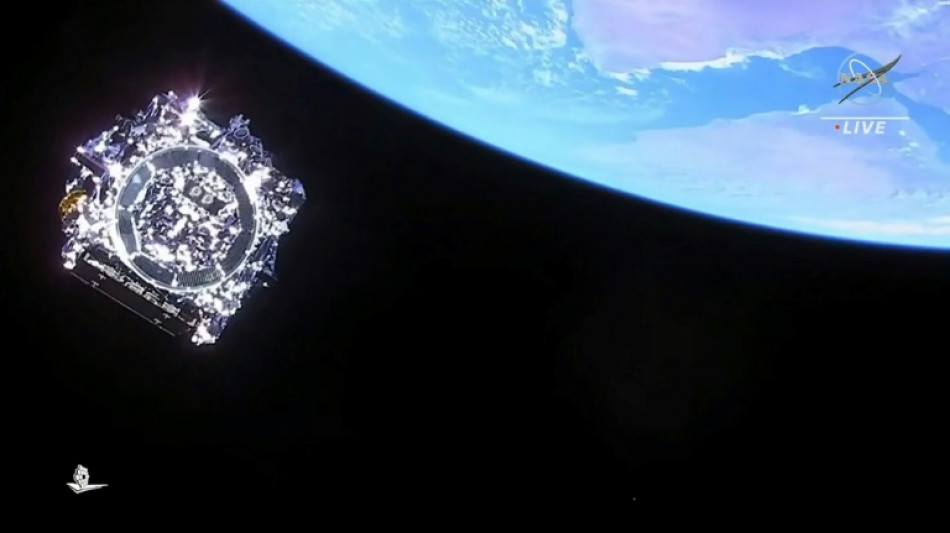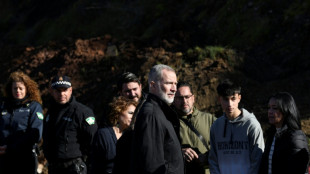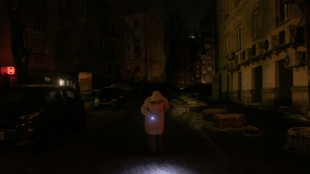
-
 Men's Fashion Week kicks off in Paris with tributes for Valentino
Men's Fashion Week kicks off in Paris with tributes for Valentino
-
Lake named as captain as Wales unveil Six Nations squad

-
 Royals visit deadly train crash site as Spain mourns
Royals visit deadly train crash site as Spain mourns
-
Police, pro-Kurd protesters clash at Turkey border with Syria

-
 Thai forces razed Cambodian homes on border: rights group
Thai forces razed Cambodian homes on border: rights group
-
Jellyfish-inspired Osaka battles into Australian Open round two

-
 Valentino taught us to respect women, says partner
Valentino taught us to respect women, says partner
-
Australia stiffens hate crime, gun laws after Bondi attack

-
 Mercedes chief designer Owen to leave F1 team
Mercedes chief designer Owen to leave F1 team
-
Trump unloads on allies as Davos showdown looms

-
 Moscow revels in Trump's Greenland plans but keeps concerns quiet
Moscow revels in Trump's Greenland plans but keeps concerns quiet
-
Global tourism hit new record level in 2025: UN

-
 Senegal poised to party with parade honouring AFCON champs
Senegal poised to party with parade honouring AFCON champs
-
Osaka emerges for Melbourne opener under hat, veil and parasol

-
 Dogsled diplomacy in Greenland proves elusive for US
Dogsled diplomacy in Greenland proves elusive for US
-
Almost half of Kyiv without heat, power, after Russian attack

-
 EU vows 'unflinching' response to Trump's Greenland gambit
EU vows 'unflinching' response to Trump's Greenland gambit
-
Osaka steals show at Australian Open as Sinner strolls through

-
 Brignone impresses in first run of Kronplatz giant slalom in World Cup comeback
Brignone impresses in first run of Kronplatz giant slalom in World Cup comeback
-
Osaka emerges for Melbourne opener under white hat and umbrella

-
 Malawi suffers as US aid cuts cripple healthcare
Malawi suffers as US aid cuts cripple healthcare
-
Bessent says Europe dumping US debt over Greenland would 'defy logic'

-
 Freeze, please! China's winter swimmers take the plunge
Freeze, please! China's winter swimmers take the plunge
-
Talks between Damascus, Kurdish-led forces 'collapse': Kurdish official to AFP

-
 In-form Bencic makes light work of Boulter at Australian Open
In-form Bencic makes light work of Boulter at Australian Open
-
Spain mourns as train disaster toll rises to 41

-
 Sinner into Melbourne round two as opponent retires hurt
Sinner into Melbourne round two as opponent retires hurt
-
Israel begins demolitions at UNRWA headquarters in east Jerusalem

-
 Almost half of Kyiv without heat, power, after Russian attack: govt
Almost half of Kyiv without heat, power, after Russian attack: govt
-
Veteran Monfils exits to standing ovation on Australian Open farewell

-
 Precision-serving former finalist Rybakina powers on in Melbourne
Precision-serving former finalist Rybakina powers on in Melbourne
-
South Korea's women footballers threaten boycott over conditions

-
 Equities sink, gold and silver hit records as Greenland fears mount
Equities sink, gold and silver hit records as Greenland fears mount
-
Australian lawmakers back stricter gun, hate crime laws

-
 EU wants to keep Chinese suppliers out of critical infrastructure
EU wants to keep Chinese suppliers out of critical infrastructure
-
AI reshaping the battle over the narrative of Maduro's US capture

-
 Penguins bring forward breeding season as Antarctica warms: study
Penguins bring forward breeding season as Antarctica warms: study
-
Vietnam leader pledges graft fight as he eyes China-style powers

-
 Ukrainian makes soldier dad's 'dream come true' at Australian Open
Ukrainian makes soldier dad's 'dream come true' at Australian Open
-
'Timid' Keys makes shaky start to Australian Open title defence

-
 Indiana crowned college champions to complete fairytale season
Indiana crowned college champions to complete fairytale season
-
South Koreans go cuckoo for 'Dubai-style' cookies

-
 Harris leads Pistons past Celtics in thriller; Thunder bounce back
Harris leads Pistons past Celtics in thriller; Thunder bounce back
-
Tjen first Indonesian to win at Australian Open in 28 years

-
 Long-delayed decision due on Chinese mega-embassy in London
Long-delayed decision due on Chinese mega-embassy in London
-
Djokovic jokes that he wants slice of Alcaraz's winnings

-
 Trump tariff threat 'poison' for Germany's fragile recovery
Trump tariff threat 'poison' for Germany's fragile recovery
-
Tourists hit record in Japan, despite plunge from China

-
 Jittery Keys opens Melbourne defence as Sinner begins hat-trick quest
Jittery Keys opens Melbourne defence as Sinner begins hat-trick quest
-
The impact of Trump's foreign aid cuts, one year on


Webb telescope discovers oldest galaxies ever observed
The James Webb Space Telescope has discovered the four most distant galaxies ever observed, one of which formed just 320 million years after the Big Bang when the universe was still in its infancy, new research said on Tuesday.
The Webb telescope has unleashed a torrent of scientific discovery since becoming operational last year, peering farther than ever before into the universe's distant reaches -- which also means it is looking back in time.
By the time light from the most distant galaxies reaches Earth, it has been stretched by the expansion of the universe and shifted to the infrared region of the light spectrum.
The Webb telescope's NIRCam instrument has an unprecedented ability to detect this infrared light, allowing it to quickly spot a range of never-before-seen galaxies -- some of which could reshape astronomers' understanding of the early universe.
In two studies published in the Nature Astronomy journal, astronomers revealed they have "unambiguously detected" the four most distant galaxies ever observed.
The galaxies date from 300 to 500 million years after the Big Bang more than 13 billion years ago, when the universe was just two percent of its current age.
That means the galaxies are from what is called "the epoch of reionisation," a period when the first stars are believed to have emerged. The epoch came directly after the cosmic dark ages brought about by the Big Bang.
- 'Surprising' -
Stephane Charlot, a researcher at the Astrophysics Institute of Paris and co-author of the two new studies, told AFP that the farthest galaxy -- called JADES-GS-z13-0 -- formed 320 million years after the Big Bang.
That is the greatest distance ever observed by astronomers, he said.
The Webb telescope also confirmed the existence of JADES-GS-z10-0, which dates from 450 million years after the Big Bang and had previously been spotted by the Hubble Space Telescope.
All four galaxies are "very low in mass," weighing roughly a hundred million solar masses, Charlot said. The Milky Way, in comparison, weighs 1.5 trillion solar masses by some estimations.
But the galaxies are "very active in star formation in proportion to their mass," Charlot said.
Those stars were forming "at around the same rate as the Milky Way," a speed that was "surprising so early in the Universe," he added.
The galaxies were also "very poor in metals," he added.
This is consistent with the standard model of cosmology, science's best understanding of how the universe works, which says that the closer to the Big Bang, the less time there is for such metals to form.
- Technical tour de force' -
However in February, the discovery of six massive galaxies from 500-700 million years after the Big Bang led some astronomers to question the standard model.
Those galaxies, also observed by the Webb telescope, were bigger than thought possible so soon after the birth of the universe -- if confirmed, the standard model could need updating.
Pieter van Dokkum, an astronomer at Yale University not involved in the latest research, hailed the confirmation of the four newly-discovered distant galaxies as a "technical tour de force".
"The frontier is moving almost every month," van Dokkum commented in Nature, adding that there was now "only 300 million years of unexplored history of the universe between these galaxies and the Big Bang".
The Webb telescope has observed possible galaxies even closer to the Big Bang, but they have yet to be confirmed, he said.
J.Fankhauser--BTB



